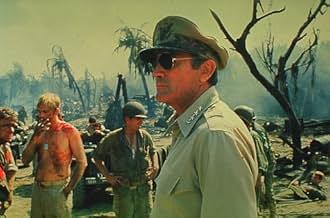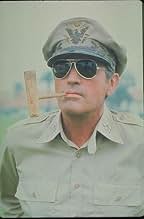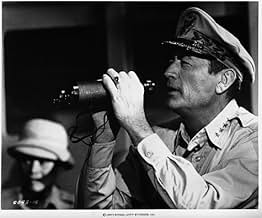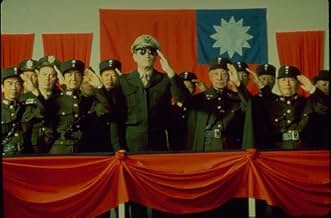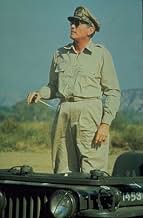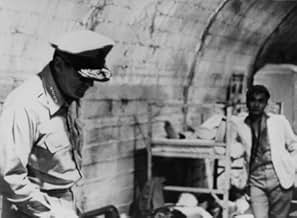Il generale MacArthur, una figura carismatica e allo stesso tempo complessa, dai trionfi alle sconfitte della sua brillante carriera dal 1942, nelle Filippine, al 1951 fino al suo ritorno al... Leggi tuttoIl generale MacArthur, una figura carismatica e allo stesso tempo complessa, dai trionfi alle sconfitte della sua brillante carriera dal 1942, nelle Filippine, al 1951 fino al suo ritorno alla guerra, in Corea che portò al suo allontanamento dall'esercito.Il generale MacArthur, una figura carismatica e allo stesso tempo complessa, dai trionfi alle sconfitte della sua brillante carriera dal 1942, nelle Filippine, al 1951 fino al suo ritorno alla guerra, in Corea che portò al suo allontanamento dall'esercito.
- Premi
- 2 candidature
- Admiral King
- (as Russell D. Johnson)
Trama
Lo sapevi?
- QuizAt the start of filming, Gregory Peck disliked General Douglas MacArthur. After filming he changed his mind, understanding the challenges MacArthur had faced. He also stated he believed President Harry S. Truman was wrong to relieve MacArthur of his command in Korea in April 1951.
- BlooperIn the opening scene of the bombardment of the 1950 amphibious landing at Inchon, an air strike is depicted where clearly the silhouette of an F4 Phantom is shown, an aircraft that didn't enter service until 1960.
- Citazioni
[Responding to restrictive attack orders]
General Douglas MacArthur: In all my fifty years of military service, I have never learned how to bomb HALF a bridge!
- Versioni alternativeThe UK DVD issue omits the sequence where MacArthur meets Emperor Hirohito, but instead, adds to the ending. The film now ends with MacArthur and his wife watch a TV transmission of the presidential inauguration of Eisenhower MacArthur's comment: "He will turn out fine. He was the best clerk that ever served under me"), followed by the end of MacArthur's farewell speech at West Point. The subsequent credits starts to roll slightly earlier than previously.
But all in all, I think this is a remarkably balanced look at an extremely controversial person. For those who know little about MacArthur, it's a good place to start. He was a larger-than-life figure, and in this film you can see both why he was revered and why he was despised.
Although MacArthur came of age in the 19th century and became a general in World War I, this movie focuses on his high and lows in World War II and the Korean War. During that time he was an iconic figure. "Iconic" is an overused word, but it applies to him. With his trademark hat and corncob pipe, plus his curiously old-fashioned way of speaking and his instinct for controversy, he was unmistakable and larger than life.
During the late 1970s, the post-Watergate era, traditional war pictures were no longer in vogue. "M*A*S*H," the mildly pacifist TV series set in the Korean War, treated MacArthur as a rather silly figure. But this movie, made in 1977, takes the man seriously, while showing his flaws clearly. It also is more frank than most classic films about how little consensus there is in warmaking. Leaders quarrel and connive while making policy, and the most loyal grunts are often dismayed at the decisions that put them in harm's way.
Gregory Peck is excellent in capturing the complexity of Douglas MacArthur. Peck was an outspoken political liberal, and one has to assume he was no admirer of the unabashedly right-wing MacArthur. But he takes on the man's persona admirably.
After heaping so much praise on "MacArthur," I must admit it is not great cinema. It's more interesting than moving. But if you're under 50 and know Douglas MacArthur only as a name in the history books, this will be an eye-opener. Like any good introduction to a subject, it should encourage you to seek other information and form your own opinions about the man and his times.
I più visti
- How long is MacArthur?Powered by Alexa
Dettagli
Botteghino
- Budget
- 9.000.000 USD (previsto)
Contribuisci a questa pagina


